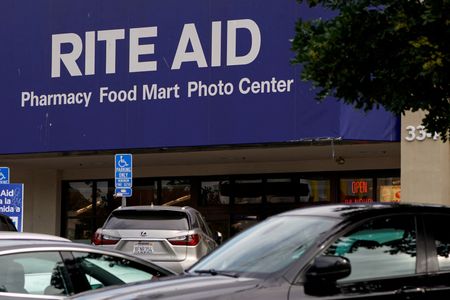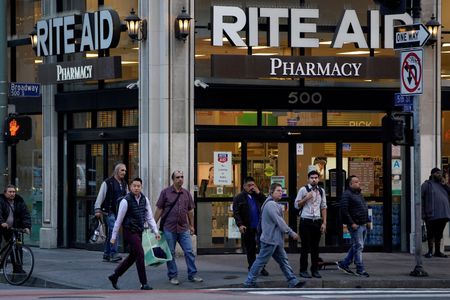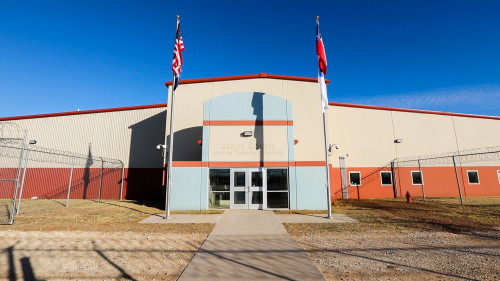By Dietrich Knauth
NEW YORK (Reuters) – Rite Aid sued the U.S. Department of Justice on Thursday, seeking to block a lawsuit alleging that the bankrupt pharmacy chain ignored red flags and illegally filled hundreds of thousands of prescriptions for addictive opioid medication.
The DOJ, which sued Rite Aid in March, agreed only to a “brief pause” of its lawsuit after Rite Aid went bankrupt last month, a position that threatens to undermine the company’s restructuring efforts, Rite Aid said in a complaint filed on Thursday in New Jersey bankruptcy court.
Rite Aid asked U.S. Bankruptcy Judge Michael Kaplan to rule that the DOJ lawsuit cannot proceed while Rite Aid is bankrupt, which would put the government on equal footing with other opioid plaintiffs whose lawsuits were automatically stopped by the company’s bankruptcy filing.
The DOJ has argued that U.S. bankruptcy law does not stop it from exercising its “police powers” through its lawsuit.
Rite Aid would not concede that point, and said Kaplan, who is overseeing the company’s Chapter 11 proceedings, should rule on that dispute rather than the judge overseeing the DOJ’s lawsuit in Cleveland federal court.
Rite Aid, which operates about 2,000 retail pharmacies in 17 U.S. states, filed for bankruptcy protection on Oct. 15, seeking to close underperforming stores, sell its pharmacy benefit company Elixir and resolve over 1,600 lawsuits alleging it oversold addictive opioid medications by filling illegal or suspicious prescriptions.
A court-appointed committee representing opioid plaintiffs warned Kaplan at a Thursday court hearing in Trenton, New Jersey, that Rite Aid’s bankruptcy could result in no payment to victims injured by the company’s allegedly reckless sale of opioid drugs.
“Rite Aid made money on tort claimants and now proposes to provide them nothing in return,” attorney Arik Preiss said.
Rite Aid competitors Walgreens, Walmart and CVS have agreed to pay $13.8 billion to settle a wave of similar opioid lawsuits outside of bankruptcy.
Preiss said Rite Aid’s opioid creditors could find themselves opposing both the company, which seems to be prioritizing its top lenders over other stakeholders, as well as the DOJ, which has disrupted opioid settlements in the bankruptcies of Endo International and Purdue Pharma.
The DOJ appealed Purdue’s bankruptcy settlement to the U.S. Supreme Court when nearly all other creditors wished to settle, and its opposition delayed Endo’s proposal to sell itself to a group of lenders and pay nearly $600 million in settlements to states and people afflicted by the U.S. opioid crisis.
Rite Aid attorney Josh Sussberg said in court that the pharmacy chain’s bankruptcy is “not an opioid case” like Endo or Purdue, because the company’s significant retail operation costs create more pressure to quickly reach a bankruptcy settlement.
(Reporting by Dietrich Knauth; Editing by Bill Berkrot and Alexia Garamfalvi)







